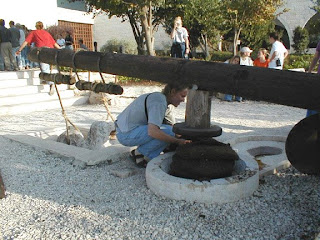We discussed the meaning of "Gethsemane". It's a Greek transliteration of the Hebrew words Gath (meaning vat or press) and Shemen (meaning oil)--Gethsemane means "oil press". We took a look at the ancient process of olive oil production.
 When the olives are first gathered the are crushed by this large stone wheel which is usually pushed by an animal. This first crushing can be used to produce "virgin" olive oil which would have been used in ancient times for temple ordinances and other use.
When the olives are first gathered the are crushed by this large stone wheel which is usually pushed by an animal. This first crushing can be used to produce "virgin" olive oil which would have been used in ancient times for temple ordinances and other use. The pulp is then gathered into bags as shown.
The pulp is then gathered into bags as shown.
 The bags can then be placed in the beam press, or Gethsemene.
The bags can then be placed in the beam press, or Gethsemene. When the press is lowered the initial color of the oil that oozes from the bags is a dark reddish-brown, much like the color of blood. This oil would have been used for more of the day to day temporal activities such as lighting lamps.
When the press is lowered the initial color of the oil that oozes from the bags is a dark reddish-brown, much like the color of blood. This oil would have been used for more of the day to day temporal activities such as lighting lamps.I know the Jesus Christ went to Gethsemane that night and that he underwent a similar process. As he prayed to the Father, the weight of all the world came down upon him until even he bled from every pore. His atonement was for our benefit-both for our spiritual and our temporal concerns. I believe he went through an initial "pressing" to atone for our sins, but that he stayed the course and underwent a second "pressing" so that he could lift all of our other burdens. The Book of Mormon prophet Alma put it this way,
"And he shall go forth, suffering pains and afflictions and temptations of every kind; and this that the word might be fulfilled which saith he will take upon him the pains and the sicknesses of his people. And he will take upon him death, that he may loose the bands of death which bind his people; and he will take upon him their infirmities, that his bowels may be filled with mercy, according to the flesh, that he may know according to the flesh how to succor his people according to their infirmities."
He did it because he loves us, and as John said, "Greater love hath no man than this, that a man lay down his life for his friends. "





